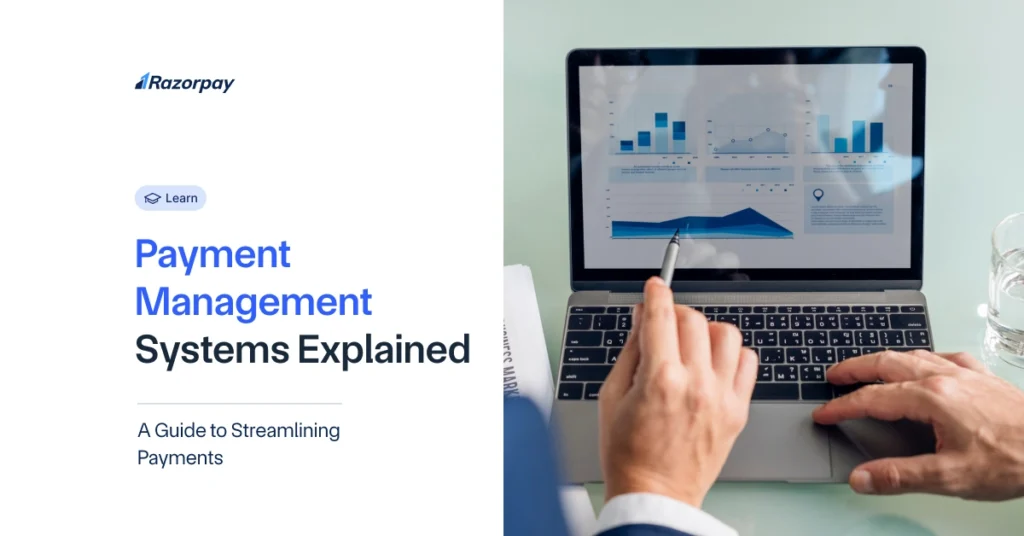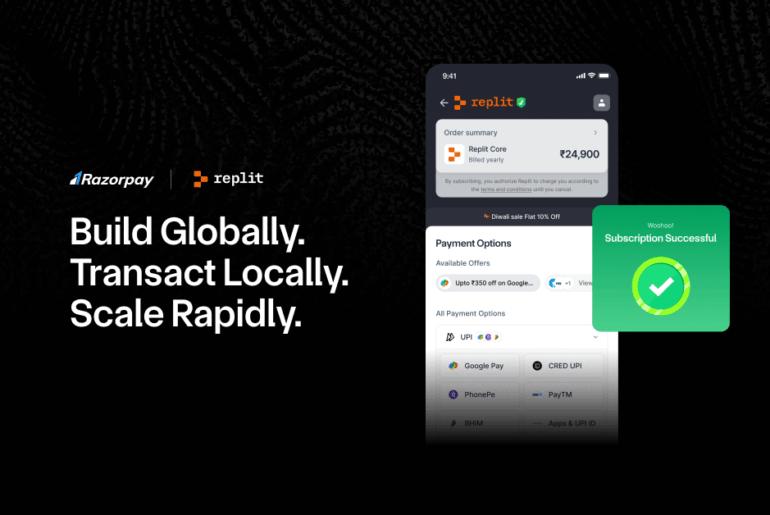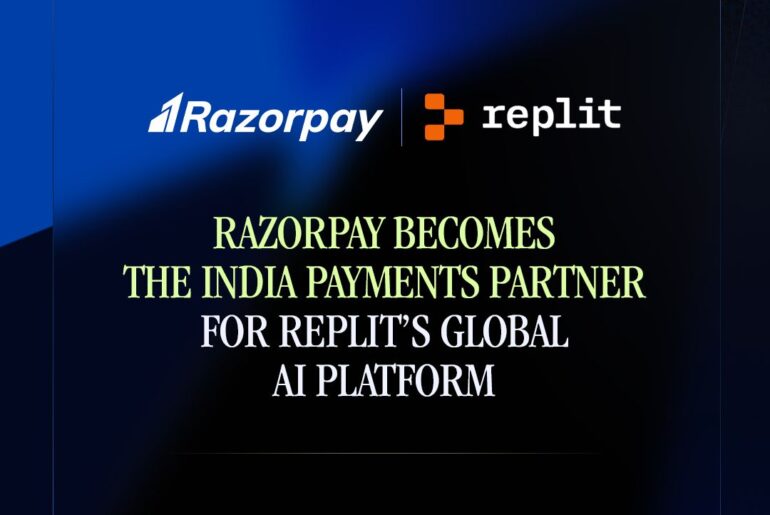Table of Contents
What is a Payment Management System?
A payment management system (PMS) is an all-in-one software solution that helps businesses of all sizes streamline how they handle payments, invoices, and financial transactions. At its core, a PMS centralizes and automates payment processing, making the entire payment lifecycle smooth, secure, and efficient across multiple payment channels.
Whether you are a small startup or a large enterprise, managing payments manually can lead to errors, delays, and security risks. A payment management system ensures secure and seamless payment processing through various channels like cards, UPI, bank transfers, and digital wallets. It integrates critical functions like invoicing, payment collection, and transaction reconciliation into a single platform, empowering businesses to optimize cash flow and financial management.
Many PMS solutions include built-in features like Payment Gateway integration, enabling businesses to securely accept online payments without worrying about complicated technical setups. This makes a payment management system essential for businesses aiming to improve operational efficiency and customer satisfaction.
How Does Payment Management Software Enhance Business Operations?
Businesses today face constant pressure to improve cash flow, reduce payment delays, and maintain accurate financial records. A payment management software addresses these challenges by automating many time-consuming manual tasks such as invoice creation, payment reminders, and reconciliation.
With automation, businesses can significantly reduce errors and processing times, which helps avoid late payments and improves vendor relationships. This leads to a smoother operational workflow and better financial health.
Integration with popular accounting tools is another key benefit, providing real-time visibility into payment statuses and financial performance. Such integration allows businesses to track cash flow closely and make strategic decisions quickly.
Furthermore, businesses can streamline payment processing across different modes — whether it’s card payments, UPI, bank transfers, or digital wallets. For companies with recurring billing models, leveraging Subscriptions features within their PMS ensures automated, hassle-free billing cycles, improving customer retention and predictability of revenue.
Custom Payment Pages also allow businesses to collect payments via a user-friendly interface without requiring complex development efforts, making the payment experience seamless for customers.
Essential Functions Offered by Payment Management Systems
A modern payment management system offers a rich suite of features designed to simplify and secure business payment workflows:
-
Invoice Processing:
Automates the generation, delivery, and tracking of invoices, reducing manual errors.
-
Payment Automation:
Automates the capture of payments, sending reminders, and reconciliation to save time.
-
Fraud Detection:
Incorporates advanced security like two-factor authentication (2FA), transaction velocity limits, and anomaly detection to protect businesses from fraudulent transactions.
-
Secure Payment Processing:
Uses encryption and secure protocols to protect sensitive customer data during transactions.
-
Multi-Currency Support:
Enables businesses dealing with international clients to process payments in multiple currencies seamlessly.
-
Data Analytics and Reporting:
Tracks payment patterns, detects bottlenecks, and provides actionable insights for better financial decision-making.
-
Compliance Management:
Helps businesses adhere to local and international regulations such as PCI DSS and GDPR, reducing legal and financial risks.
Secure payment processing is fundamental to a PMS, and with features like encryption and fraud detection, businesses can safeguard both their funds and customer data effectively.
What Are the Benefits of a Payment Management System?
Implementing a payment management system can deliver several significant advantages:
- Improved Cash Flow: Automated invoicing and timely payment collection reduce delays and improve liquidity.
- Cost Savings: Reducing manual processes cuts down on administrative overhead and errors.
- Enhanced Security: Advanced fraud detection tools protect against chargebacks and financial losses.
- Better Vendor and Customer Relationships: Reliable, accurate payments build trust and improve business partnerships.
- Real-Time Financial Insights: Data-driven decision-making becomes easier with real-time tracking and reporting.
- Operational Efficiency: Streamlined workflows reduce administrative burden, freeing staff to focus on growth.
Together, these benefits contribute to smoother business operations, allowing companies to focus on scaling and serving their customers better.
Impact of Modern Payment Management System Software
Today’s payment management systems leverage cutting-edge technologies like Artificial Intelligence (AI), automation, and cloud computing to transform payment workflows:
- AI-powered automation improves fraud detection by analyzing transaction patterns and predicting suspicious activities.
- Automated reminders and reconciliations drastically reduce manual interventions.
- Cloud-based platforms offer scalability and reliability, enabling businesses to process increasing transaction volumes without downtime.
- Digital transformation has enabled businesses to manage complex payment ecosystems efficiently, integrating seamlessly with various financial and operational systems.
Fintech innovations and digital payment trends continue to push PMS solutions toward becoming more intelligent, agile, and user-friendly, helping businesses future-proof their payment infrastructure.
The Diverse World of Payment Management Systems
Payment management systems today come in various types to serve different business needs:
-
Small Business PMS:
Usually cloud-based, cost-effective, and easy to deploy, ideal for startups and SMEs.
-
E-commerce PMS:
Tailored for online retailers with features like multi-channel payment processing, fraud prevention, and subscription billing.
-
Enterprise PMS:
Designed for large businesses needing high transaction volume handling, multi-currency support, and deep integrations.
Choosing the right PMS depends on factors like transaction volume, industry, payment types accepted, and integration requirements. Evaluating these will help businesses select a system that fits their unique needs.
Conclusion
A Payment Management System (PMS) helps businesses automate and secure their entire payment process—from invoicing to reconciliation. Whether you’re a startup or a large enterprise, using a PMS can improve cash flow, reduce errors, boost security, and streamline operations. With features like fraud detection, multi-currency support, and accounting integration, it’s a smart move for any business looking to grow efficiently.
Frequently Asked Questions (FAQs)
What is the difference between a payment gateway and a payment management system?
A payment gateway is a technology that securely processes payment transactions by authorizing and transferring payment data between customers and banks. In contrast, a payment management system is a broader platform that not only processes payments but also automates invoicing, reconciles accounts, manages subscriptions, detects fraud, and integrates with accounting software.
How does a PMS help with secure payment processing?
A PMS employs encryption, fraud detection tools like 2FA, and secure communication protocols to protect transaction data and prevent fraudulent activities, ensuring secure payment processing.
Can small businesses benefit from a PMS, or is it just for large enterprises?
Small businesses can greatly benefit from PMS by automating payment workflows, improving cash flow, and securing transactions, just like large enterprises. Cloud-based PMS solutions make it affordable and scalable for smaller companies.
How to choose the right payment management system?
Evaluate your business’s transaction volume, payment types, integration needs, and security requirements. Look for features like automation, fraud prevention, and multi-currency support to select the best PMS.
Can a payment management system integrate with accounting software?
Yes, most modern PMS platforms offer seamless integration with popular accounting tools, providing real-time financial visibility and automating bookkeeping tasks.


